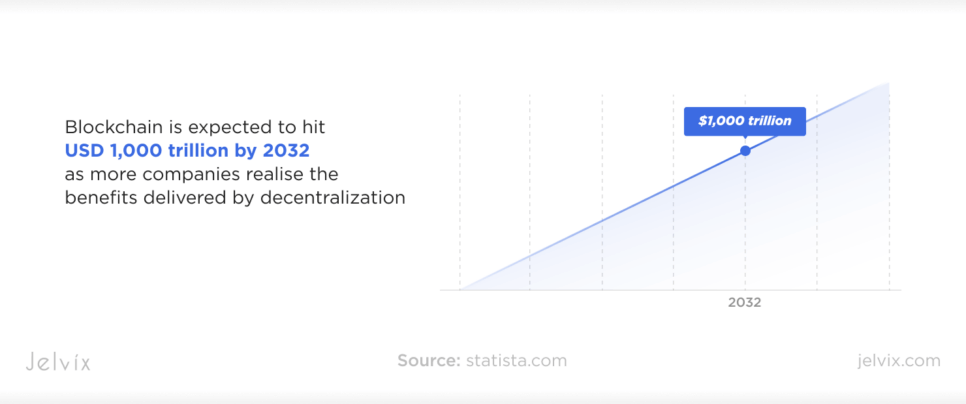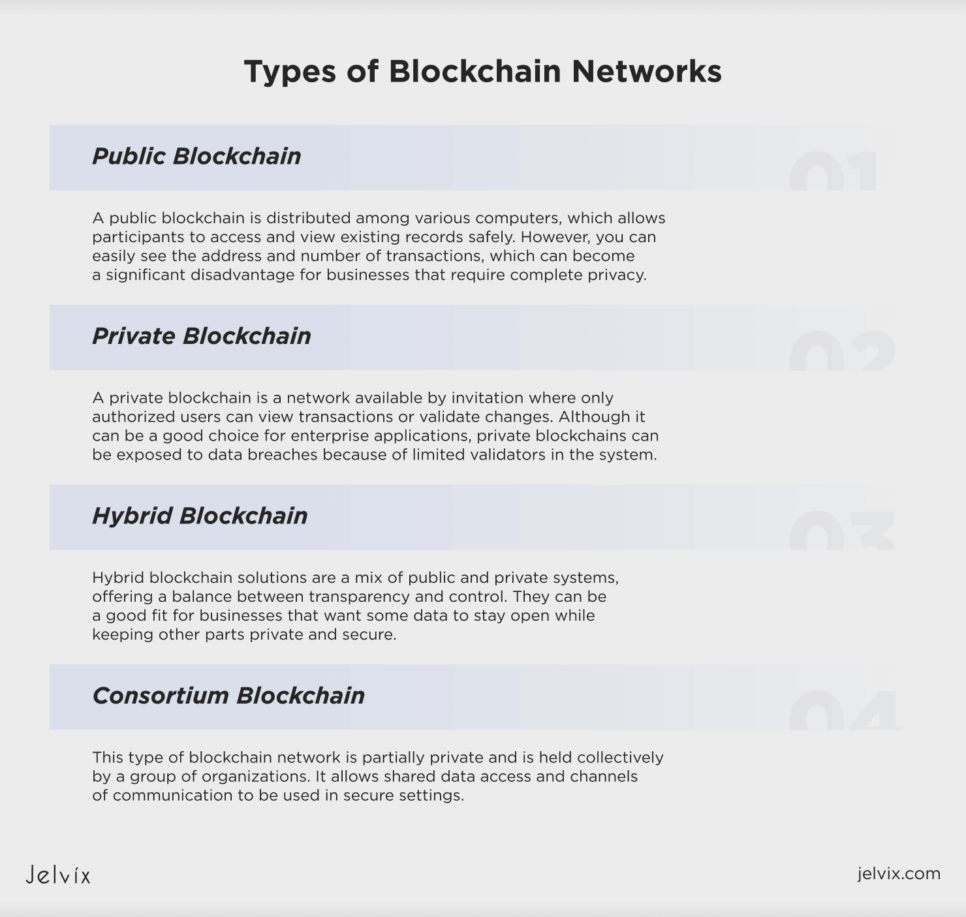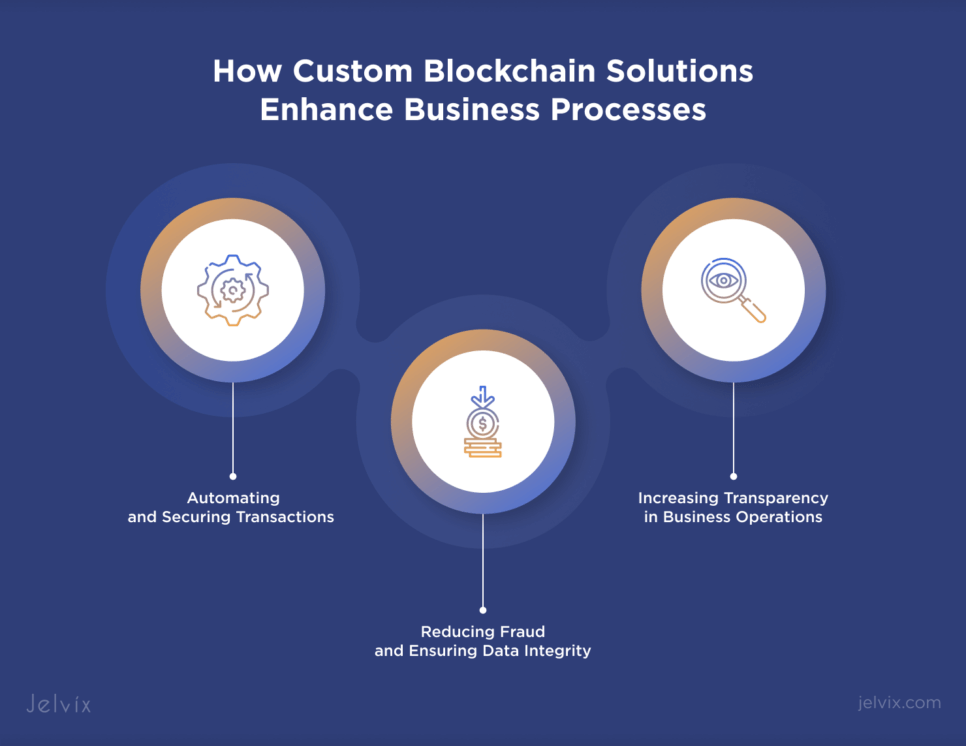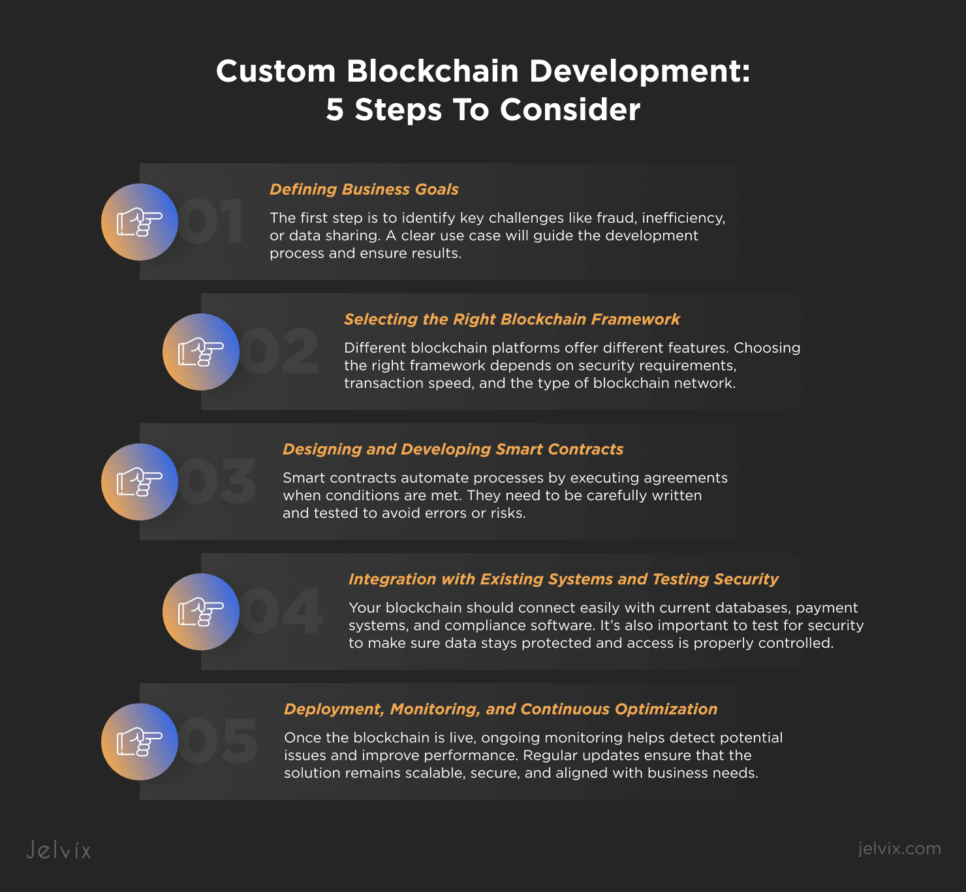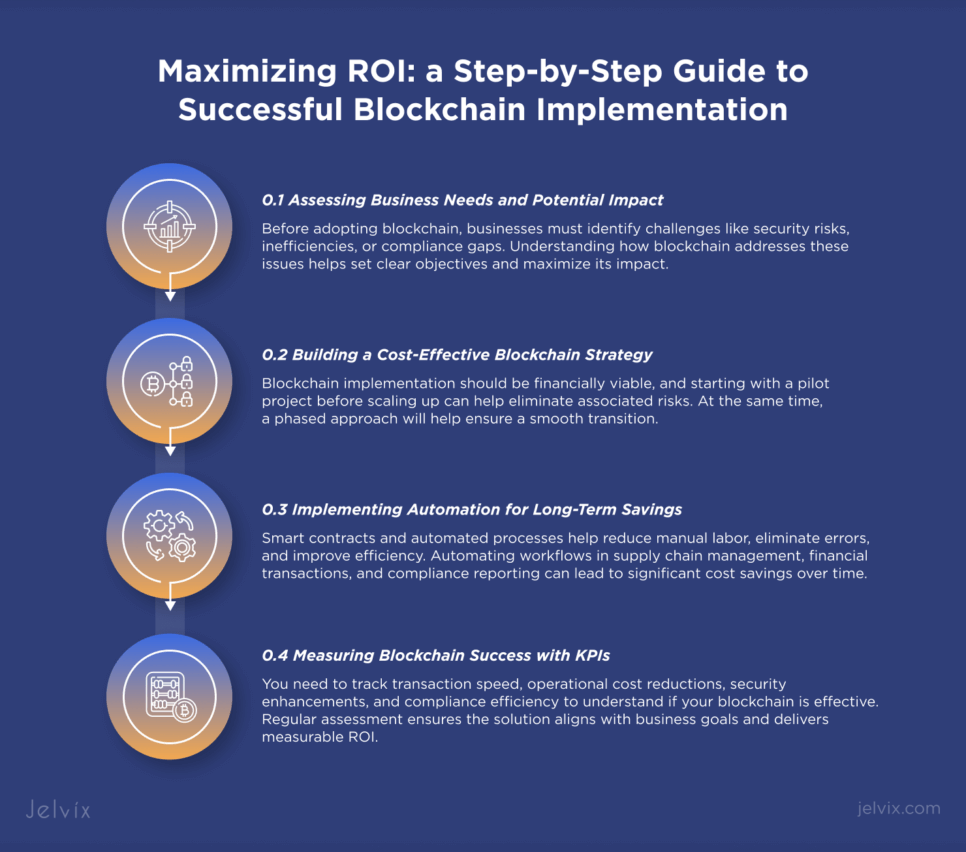Global businesses strive to survive in a highly competitive market, and, for this reason, actively adopt new technology. Blockchain, for instance, is expected to hit USD 1,000 trillion by 2032 as more companies realise the benefits delivered by decentralization.
Blockchain has much to offer, but implementing it isn’t always easy, as you still have to connect it with older systems, figure out how to scale it, and ensure the costs stay manageable.
If you want to enhance data security and make business processes smoother with blockchain, read this article. You’ll explore key differences between ready-made solutions and those tailored to your needs and learn more about the process of custom enterprise software development.
Understanding Blockchain Applications, Their Types, and Key Concepts
Blockchain is a decentralized digital system known for its advanced security measures. Unlike centralized data storage, blockchain uses a network of computers located in different places to ensure data accuracy and security.
Blockchain records each transaction you make in a block, a unit that adds your verified transaction to a chain of previous ones. That is why blockchain is highly resistant to fraud and unauthorized data changes.
How Blockchain Ensures Features for Businesses
The intensity of cyber attacks increases, and 16.8 billion exposed data records in 2024 confirm this. However, blockchain can help you strengthen defenses and support your AI software development efforts.
Decentralization
Traditional systems are highly vulnerable to cyberattacks because they rely on a central system. On the other hand, blockchain spreads data across multiple computers, which helps reduce the chance of breaches.
Encryption
All transactions stored in the blockchain are protected with cryptographic algorithms that aren’t easy to access. Only authorized users can view this data, leaving no chance of attacks.
Immutability
You can’t change data recorded on the blockchain. This feature makes each transaction integral, which also simplifies business audits.
Types of Blockchain Networks
Although blockchain involves the same process for recording and storing different transactions, not all blockchains work the same way. You can choose among different types depending on your needs.
Public Blockchain
A public blockchain is distributed among various computers, allowing participants to access and view existing records safely. You can easily see the address and number of transactions, which can become a significant disadvantage for businesses that require complete privacy.
Private Blockchain
A private blockchain is a network available by invitation where only authorized users can view transactions or validate changes. Although it can be a good choice for enterprise applications, private blockchains can be exposed to data breaches because of limited validators in the system.
Hybrid Blockchain
Hybrid blockchain solutions are a mix of public and private systems, offering a balance between transparency and control. They can be a good fit for businesses that want some data to stay open while keeping other parts private and secure.
Consortium Blockchain
This type of blockchain network is partially private and is held collectively by a group of organizations. It allows shared data access and channels of communication to be used in secure settings.
Custom vs Off-the-Shelf Blockchain Solutions: Key Differences
Similar to other tech solutions, there are pre-made and custom-made blockchain tools. You need to understand key differences to make wise business decisions.
Learn how to choose between custom and off-the-shelf software solutions to align with your business goals, budget, and long-term scalability.
The Flexibility of Custom Blockchain Solutions for Industry-Specific Needs
Off-the-shelf blockchain tools can be helpful, but they often don’t fit every industry’s unique processes. Custom solutions give you the freedom to build around what your business actually needs.
In healthcare software development, for example, a custom blockchain system can support secure data exchange, patient consent tracking, and compliance with HIPAA or GDPR. This flexibility makes it easier to align with regulations and connect to existing systems without forcing you to change the way you work.
Key Pros and Cons of Blockchain Technology in Off-the-Shelf Solutions
If you have a small company and want to try a blockchain-based tool, ready-made solutions can be what you need. However, they might not provide the necessary level of flexibility and may lack some specific features.
Pros of Pre-Made Blockchain Solutions
To start with, off-the-shelf tools are faster to implement because they already contain basic features you can use from the very beginning. They are cheaper to operate because you don’t have to hire an IT team and update them on your own. In addition, you can be sure that they remain safe because it’s your provider’s responsibility to make upgrades.
Cons of Off-the-Shelf Blockchain Solutions
Pre-built blockchain solutions can be a quick way to get started, but they don’t always hold up for businesses with specific or complex needs. Since they’re designed to work for a broad range of users, they often lack the features that match your exact processes. Integration can also be tricky. These tools don’t always fit well with the systems you already use, and scaling them later might require costly tweaks.
Top Cases When Off-the-Shelf Solutions Work Best
Off-the-shelf blockchain solutions can be a good starting point for businesses that want to explore blockchain technology without the complexity and cost of custom development.
Pre-built blockchain systems are usually affordable and simple to implement, which is especially convenient for businesses with limited resources. These solutions allow companies to test blockchain apps before committing to larger investments, saving costs and time.
If your business doesn’t require blockchain to connect with ERP, CRM, or other enterprise systems, you can freely use off-the-shelf solutions without worrying about compatibility concerns.
Ready-made blockchain solutions can offer a quick way to improve security, automate processes, and meet regulatory requirements for companies that need a fast deployment.
Ready-made blockchain systems include built-in security and compliance features, making them suitable for businesses with standard regulatory needs in different industries.
How Custom Blockchain Solutions Enhance Business Processes
Despite all the advantages of pre-built solutions, they can lose efficiency with time. When your business becomes more complex, it will need better scalability and integration, so investing in a custom blockchain saas application development can be a good idea for you now.
Automating and Securing Transactions
Manual processes slow things down and increase the chance of errors. With blockchain, transactions can be automated using smart contracts–agreements that trigger actions when conditions are met. This reduces the need for third-party involvement and makes every transaction faster, more reliable, and much harder to tamper with.
Reducing Fraud and Ensuring Data Integrity
Because blockchain records can’t be changed without leaving a trace, it’s much harder to alter data unnoticed. This helps protect sensitive information and keeps records accurate, which is especially important in industries with strict compliance rules.
Increasing Transparency in Business Operations
Blockchain makes it easier to build trust between partners, teams, or even customers with a shared, real-time view of transactions. Everyone sees the same data, which reduces disputes and helps keep operations smooth.
Using Blockchain in Different Industries
You can’t survive the competition if you don’t meet increasing market demands. Blockchain helps to do so, as it can provide stronger security and transparency. Different sectors can use blockchain technology depending on their specific industry requirements.
Securing Records and Preventing Fraud in Healthcare
Clinics use blockchain because it gives them better data integrity and helps meet legal regulations. In fact, 55% of medical apps already use blockchain because it assists with data sharing, maintains privacy, and helps prevent fraud in billing and insurance claims.
Discover how blockchain technology enhances security, transparency, and data management in healthcare.
Finance: Transparent Transactions and Fraud Detection
Banks use blockchain for secure and real-time transaction verification, reducing fraud and unauthorized changes. Smart contracts automate payments, loans, and settlements, improving efficiency.
Real Estate: Secure Transactions and Digital Identities
Blockchain simplifies real estate software development. It enhances property transactions by ensuring secure and verifiable records of ownership, while digital identities help verify buyers, sellers, and property details, reducing fraud risks.
Supply Chain Management: End-to-End Tracking and Efficiency
Blockchain tracks goods from production to delivery, preventing counterfeits and ensuring transparency. Smart contracts automate processes, reducing delays and improving efficiency.
Energy, Retail, and Manufacturing
Blockchain enhances energy trading by enabling secure peer-to-peer transactions. In retail, it helps track product origins and prevent counterfeit goods. Manufacturing companies use blockchain to improve quality control, verify supplier authenticity, and streamline operations.
Overcoming Top Challenges and Addressing Limitations of Blockchain Technology
Blockchain offers a lot of potential. But like with any other tech, you must address common problems to maximize its potential.
Scalability and Network Optimization Issues
The more transactions you have in your system, the slower your blockchain can become. To improve scalability, try using layer-2 solutions, sidechains, or permissioned blockchains, and also optimizing consensus mechanisms to enhance speed and security.
High Implementation Costs and ROI Maximization
Blockchain development can be costly, but businesses can lower expenses by starting with a pilot project, using blockchain-as-a-service, or opting for existing frameworks. Focusing on high-impact use cases can help ensure faster ROI.
Energy Consumption Concerns
Some blockchain networks are energy-intensive, which raises valid concerns about sustainability. To reduce your footprint, consider platforms that use proof of stake or hybrid consensus models. It also helps to optimize your hardware and look into carbon offset options where possible.
Regulatory and Compliance Uncertainties
Rules around blockchain vary a lot depending on your industry and location. That’s why it’s smart to work with legal advisors early on. Using permissioned blockchains and keeping detailed, auditable records can also help you stay on the safe side when it comes to compliance.
Custom Blockchain Development: 5 Steps To Consider
If you decide to implement a blockchain solution into your business, make sure to develop a clear and structured approach.
1. Defining Business Goals
The first step is to identify key challenges like fraud, inefficiency, or data sharing. A clear use case will guide the development process and ensure results.
2. Selecting the Right Blockchain Framework
Different blockchain platforms offer different features. Choosing the right framework depends on security requirements, transaction speed, and the type of blockchain network.
3. Designing and Developing Smart Contracts
Smart contracts automate processes by executing agreements when conditions are met. They need to be carefully written and tested to avoid errors or risks.
4. Integration with Existing Systems and Testing Security
Your blockchain should connect easily with current databases, payment systems, and compliance software. It’s also important to test for security to make sure data stays protected and access is properly controlled.
5. Deployment, Monitoring, and Continuous Optimization
Once the blockchain is live, ongoing monitoring helps detect potential issues and improve performance. Regular updates ensure that the solution remains scalable, secure, and aligned with business needs.
Learn how to optimize your software development process to accelerate time-to-market, reduce risks, and build solutions that truly meet user needs.
Integrating Blockchain with Existing Business Systems
To deliver value and make a positive impact on business, your blockchain solution must integrate seamlessly with existing business systems.
Ensuring Seamless Connectivity
Blockchain enhances CRM and ERP systems by securing data, automating record-keeping, and improving transparency. Cloud integration allows real-time access and scalability, ensuring smooth operations.
APIs and Middleware for Blockchain Integration
APIs and middleware help businesses integrate blockchain without overhauling existing systems. They enable secure transactions, automate data sharing, and support smart contract execution within current workflows.
Overcoming Compatibility Challenges
Around 66% of businesses invest over USD 2 million in upgrading legacy systems that often aren’t designed to work with blockchain. Companies can use hybrid models that connect blockchain with traditional databases to support flexible integrations and optimize the cost of upgrading legacy software.
Maximizing ROI: a Step-by-Step Guide to Successful Blockchain Implementation
It’s not enough to just adopt blockchain to unlock its full potential. You need a well-thought-out integration strategy that clearly defines how blockchain can help resolve your business issues.
Assessing Business Needs and Potential Impact
Before adopting blockchain, businesses must identify challenges like security risks, inefficiencies, or compliance gaps. Understanding how blockchain addresses these issues helps set clear objectives and maximize its impact.
Building a Cost-Effective Blockchain Strategy
Blockchain implementation should be financially viable, and starting with a pilot project before scaling up can help eliminate associated risks. At the same time, a phased approach will help ensure a smooth transition.
Implementing Automation for Long-Term Savings
Smart contracts and automated processes help reduce manual labor, eliminate errors, and improve efficiency. Automating workflows in supply chain management, financial transactions, and compliance reporting can lead to significant cost savings over time.
Measuring Blockchain Success with KPIs
You need to track transaction speed, operational cost reductions, security enhancements, and compliance efficiency to understand if your blockchain is effective. Regular assessment ensures the solution aligns with business goals and delivers measurable ROI.
Regulatory and Legal Considerations for Blockchain Technology Adoption
Bringing blockchain into your business means understanding the legal side.
Each industry has its own rules, and, as your blockchain solution handles sensitive data or transaction history, it needs to align with those standards.
Smart contracts, data storage, and cross-border transactions all raise legal questions. It’s a good idea to involve legal and compliance teams early. That way, you can build a system that not only works but also meets the right standards.
Laws around blockchain are still evolving. Some regions welcome it, others are cautious. Being updated on global policies, especially around privacy and crypto, can help your business stay compliant and competitive.
How To Get Started with Custom Blockchain Solutions Development
You need a clear purpose and a solid plan to start with custom blockchain development because it works best when there’s a real need for secure data or automation. Industries dealing with complex transactions or strict compliance can especially find it useful.
Start by clearly defining what you want blockchain to solve. Choose a suitable framework and test it with a small pilot project before going all in. It’s a good idea to work with developers who understand both the tech and your industry. After launch, continuously check how everything works and always seek ways to improve operations as your business expands.
The Future of a Secure and Scalable Business with Blockchain
Blockchain is starting to move past the hype and prove its value in real-world business. What’s interesting now is how it works with AI and how, together, they can do a lot more.
AI helps make sense of data fast, while blockchain keeps that data secure and verifiable. For companies dealing with fraud risks or sensitive information, that combo offers both speed and trust. And since blockchain networks are designed to scale, they’re a good fit for businesses that expect to grow.
Conclusion: Next Steps for Adopting Blockchain in Your Organization
Blockchain is a complex but efficient technology that can offer a safe way to improve business operations. However, to implement it painlessly, you need to evaluate your needs, choose the right framework, and take care of integration with existing systems, especially older ones.
As a seasoned technical partner, Jelvix focuses on helping businesses perform digital transformation smoothly and safely using advanced technologies like blockchain and AI. If you need to implement a ready-made solution or you want to develop a custom one, our experts can help. Get in touch to explore how blockchain can drive your business forward and maximize its ROI.
Ready to extend your tech strategy with precision?
Partner with a dedicated team that doesn’t just code—but architects tailored digital solutions.


